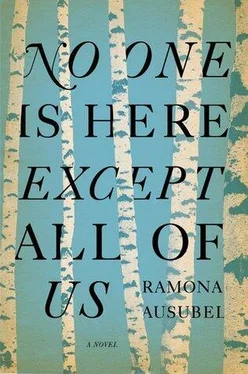My father regarded my mother’s mossy brown eyes. “I have a feeling,” he said. “A very strong feeling.” He winked.
The chicken farmer argued that we woke up in the morning and this is how it was — we were born into the world in pairs. This convinced us. Only two people decided otherwise: with a nod, the barber’s wife and the sheep shearer’s wife traded husbands. They patted on the back the ones they had come with, and said, “Nothing personal, sweetness, it’s just better this way.” Those two wives shook hands with each other as they traded positions, stood now with men they hoped to love better, longer. The men were wide-eyed, a little heartbroken to be abandoned this way and a little thrilled to be taken up by new, unexplored bosoms. The stranger’s eyelids fell closed. I wished I knew whether she wanted to be assigned a mate or permitted to be alone. I caught the jeweler watching her, but she did not look up.
“What about God?” my brother Moishe asked. “Is he the same?”
I thought about God’s view down onto the stranger’s village, the Romanian soldiers unsheathing their knives and reloading their guns. Had he seen all of that? Had he always known that he would not stop it?
We glanced around, quiet, listening.
“We just arrived here, right? The world just started,” Igor said. “Maybe he told us exactly what to do.”
“I didn’t hear anything,” my brother said, and my father patted him on the head. I began to wonder if God would be angry with us for doing away with his creation and starting again. I suggested we write a letter in explanation and ask for his blessing.
Dear God,
We did not start again because it wasn’t beautiful before. The world we make will be much smaller and less glorious than the one you made. Ours will have none of the strange, wild animals — no elephants or tigers, no parrots or blue frogs. It will have none of the exotic spices, no sea, no lakes. We are content to accept this small circle of land as our entire universe, so long as we are safe here.
I was worried that we weren’t offering anything. “What would God want from us, to prove our love?” I asked. The butcher suggested sacrificing a goat, the banker suggested charity. I thought maybe God was simply lonely, by himself for all eternity at the top of the sky. “Maybe he just wants to be told a good story,” I said. And that is what we promised to give him.
If we were going to have God, then we were going to need a temple for Him. The greatest temple ever built. The shape of that place, the glory of it, kept us talking for hours. So that the room would be flooded with the very first light of day, huge windows would face east. And others west, because the day’s end is sometimes even more spectacular than its beginning. My sister wanted to have a small pool to throw things into. The healer wanted to have a hole in the roof to leave a way in for the dead. The two oldest men wanted to cover the floor in soft feathers so we could pray lying down. Igor suggested there be someone to watch the children.
The second thing God did after inventing the earth was to invent the heavens. We had made the earth, and now we would make the sky. We would paint constellations on the ceiling of the temple, white against a background of blackest blue. The temple rose high above us, a misty vision so sparkling and grand we felt drunk. How could our God not fall in love with us?
“It sounds handsome,” my mother said. “Gold and all that. But the world started again because we wanted a safer place. A more deliberate place. How do we make sure we don’t forget that? How will we keep track of the story? Wasn’t that going to be our big offering?”
Several people sulked — they were having fun sculpting great ivory balustrades and now they had to deal with the microscopic machinery of meaning. The mist of the temple dispersed and the room became quiet.
The chicken farmer figured we could write down the things we did each day. The jeweler pointed out that we might end up with a very complete accounting of the minutiae without ever knowing what happened in any bigger sense. Laundry would be on record but not faith. The stranger was braiding the fringe from the blanket around her shoulders. She looked up from this task and gave the slightest nod to the jeweler, whose face turned red.
Igor thought we should interview one another.
I wondered if we should gather each week and write the story of what had taken place.
“We write down everyone’s prayers,” the stranger said. “Someone listens.”
“We might miss some of the events,” the banker said.
“I vote that this world is about hopes more than events,” my mother breathed. And so it would be. We voted to build a comfortable chair and a desk for the recorder to sit at, and we agreed that one of us would be there to listen, quietly writing down every prayer each of us uttered. There would be no interruption, no answers or questions.
“And what if we pray when we are in our kitchens or walking in the snow?” we wondered.
“We should listen to one another even then. If you hear a prayer, write it down and take it to the temple. We can have a box to put them in.”
“I think we need all the languages,” I said, thinking of the Russian my father sometimes spoke, the German the butcher carried on in, the Spanish, the Yiddish, the Italian, the Romanian, the Hebrew. “If praying is how we keep track, we should have a lot of words to wish with.”
“As long as we forget where they came from,” the stranger said. I promised I already had.
“Do we need protections?” my brother asked. “Do we need a wall or a shield?”
“No,” I corrected. “We are the only thing that exists. Us and God.”
We were tired by the time it grew dark. It was our first day and we had done a lot. But we had not thought ahead to this moment when the sky turned purple and we were hungry and wanted sleep. Should we stay together in the healer’s house? Should we go back to the houses we had been born owning? Some decided to sleep outside in the drizzle, curled up in the bright cold. Others wanted to sleep better, to have a feather pillow and a wall keeping the bugs out. The ones who had been born with loves wanted to love. To make use of their skin and their fingers. To celebrate their good fortune at being alive in this historic moment, at being the first of our kind, at being warm and leggy and full of good ideas.
The jeweler invited the stranger to stay with him that night. As we walked out of the healer’s house, I took the stranger’s hand and stood on tiptoe to whisper into her ear. “Will you please help me to get it right?” Speaking to her felt like calling across a wide canyon to a faraway speck of a person. She squeezed my fingers twice, then released.
At his house, the jeweler cleared silver clippings and needle-nose pliers from his softest rug. He brought out a stack of moth-eaten blankets, which had not been draped over a sleeping body for years. They had once, in another world, belonged to his mother. She and his father had both died underneath them, and since then he had kept them hidden. Tonight they belonged to a deathless world, and they would not blanket the stranger in sadness, but simply blanket her in blankets. The jeweler felt a wave wash over his heart, foamy and soft. He felt soothed. Loneliness was hushed by the sound of water breaking across the shore. The stranger stretched out and rested her head on a pillow. In the dark, she looked to the jeweler like a cave he wanted to crawl into. Lightless, yes, but peaceful and cool.
My parents scurried us three children home and put us quickly to bed. In the scratchy, wooly dark I could smell my own breath. I felt perfectly alone, happily alone. I was proud. Nothing could shake this feeling — not even the image of the stranger, seated in the chair, braiding the blanket’s fringe, her gaze fallen to the surface of the unknown sea she drifted upon. I squeezed my eyes shut tight and smiled, because everyone was playing the game. Here we were in the first night on earth. In my cave, I could say that as a fact — the first night on earth — and this made me grin so wide I could practically hear it.
Читать дальше












